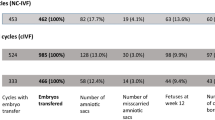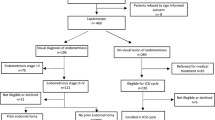Abstract
Purpose: The impact of severity of endometriosis on the outcome of in vitro fertilization (IVF) was analyzed in an uncontrolled, retrospective study in an academic IVF program.
Methods: Sixty-one patients with a primary diagnosis of endometriosis undergoing 85 cycles of IVF were included in the study. Patients were divided according to the severity of disease based on the revised American Fertility Society (AFS) classification into groups A (stages I/II, or minimal/mild) and B (stages III/IV, or moderate/severe). Group A included 32 patients undergoing 45 IVF-embryo transfer (ET) cycles; group B included 29 patients undergoing 40 IVF cycles. Exclusion criteria were age older than 40 years, basal day 3 follicle stimulating hormone (FSH) greater than 20 IU/L, male-factor infertility, assisted hatching, and gamete intrafallopian transfer cases. Stimulation for IVF cycles was standard using pituitary down-regulation with gonadotropin-releasing hormone agonist in a midluteal protocol. Controlled ovarian hyperstimulation (COH) was achieved using a combination of FSH and human menopausal gonadotropin. Outcomes assessed included response to COH and number, maturity, and quality of oocytes retrieved. Fertilization, implantation, and pregnancy rates after IVF-ET were also analyzed.
Results: The response to COH and the number, maturity, and quality of the oocytes was comparable between patients with varying severity of endometriosis. Fertilization rates for oocytes of patients in group B (stages III/IV) were significantly impaired compared to those in group A (stages I/II) (P = 0,004). The rates for implantation, clinical pregnancy, and miscarriage were comparable between the two groups.
Conclusions: The reduced fertilization potential of the oocytes obtained from patients with severe endometriosis in the absence of male-factor infertility suggests an adverse biological impact of the advanced disease on the oocytes. The outcome of IVF-ET, however, is unaffected by increasing severity of endometriosis. This suggests that IVF may compensate for or overcome this reduction in the biological potential of the oocytes associated with severe disease, thus accounting for a comparable outcome irrespective of the severity of endometriosis.
Similar content being viewed by others
REFERENCES
American Fertility Society: Revised American Fertility Society Classification for Endometriosis. Fertil Steril 1985;43:351–352
Oehninger S, Acosta AA, Kreiner D, Muasher SJ, Jones HW, Rosenwaks Z: In vitro fertilization and embryo transfer (IVF/ET): An established and successful endometriosis. J In Vitro Fert Embryo Transfer 1988;5(5):249–256
Dmowski WP, Rana N, Michalowska J, Friberg J, Papierniak C, El-Roeiy A: The effect of endometriosis, its stage and activity, and of autoantibodies on in vitro fertilization and embryo transfer success rates. Fertil Steril 1995;63(3):555–562
Matson PL, Yovich JL: The treatment of infertility associated with endometriosis by in vitro fertilization. Fert Steril 1986;46(3):432–434
Inoue M, Kobayashi Y, Honda I, Awaji H, Fujii A: The impact of endometriosis on the reproductive outcome of infertile patients. Am J Obstet Gynecol 1992;167:278–282
Tummon IS, Colwell KA, MacKinnon CE, Nisker JA, Yuzpe AA: Abbreviated endometriosis associated infertility correlates with in vitro fertilization success. J In Vitro Fert Embryo Transfer 1991;8:149–153
Geber S, Paraschos T, Atkinson G, Margara R, Winston RML: Results of IVF in patients with endometriosis: the severity of the disease does not affect the outcome or the incidence of miscarriage. Hum Reprod 1995;10(6):1507–1511
Oliveness F, Feldberg D, Liu HC, Cohen J, Moy F, Rosenwaks Z: Endometriosis: A stage by stage analysis-the role of in vitro fertilization. Fertil Steril 1995;64(2):392–398
Arici A, Oral E, Bukulmez O, Duleba A, Olive DL, Jones EE: The effect of endometriosis on implantation: Results from the Yale University in vitro fertilization and embryo transfer program. Fertil Steril 1996;65(3):603–607
Simon C, Gutiérrez A, Vidal A, Santos MJ, Tarin JJ, Remohi J, Pellicer A: Outcome of patients with endometriosis in assisted reproduction: Results from in-vitro fertilization and oocyte donation. Hum Reprod 1994;9:725–729
Yovich JL, Matson PL: The influence of infertility etiology on the outcome of IVF-ET and GIFT treatments. Int J Fertil 1990;35(1):22–29
Chillik CF, Acosta AA, Garcia JE, Perera S, Van Uem JFHM, Rosenwaks Z, Jones HW: The role of in vitro fertilization in infertile patients with endometriosis. Fertil Steril 1985;44(1):56–61
Cohen J, Alikani M, Trowbridge J, Rozenwaks Z: Implantation enhancement by selective assisted hatching using zona drilling of human embryos with poor prognosis. Hum Reprod 1992;7:685–691
Racowsky C, Folkers MF, Klasener SO, Hutchinson-Cole H, Nelson-White T, Lewis A, Cui H, Gelety TJ: Abstracts of the 44th Annual Meeting of the Pacific Coast Fertility Society, April 17–21, 1996
Yovich JL, Yovich JM, Tuvik AI, Matson PL, Wilcox DL: In vitro fertilization for endometriosis. Lancet 1985;2:552
Wardle PG, McLaughlin EA, McDermott A, Mitchell JD, Ray BD, Hull MGR: Endometriosis and ovulatory disorder: Reduced fertilization in vitro compared with tubal and unexplained infertility. Lancet 1985;236–239
Weed JC, Arguembourg PC: Endometriosis: Can it produce an autoimmune response resulting in infertility? Clin Obstet Gynecol 1980;23:885–893
Lessey BA, Castlebaum AJ, Sawin SW, Buck CA, Schinnar R, Bilker W, Strom BL: Aberrant Integrin expression in the endometrium of women with endometriosis. J Clin Endocrinol Metab 1994;79:643–649
Author information
Authors and Affiliations
Rights and permissions
About this article
Cite this article
Pal, L., Shifren, J.L., Isaacson, K.B. et al. Impact of Varying Stages of Endometriosis on the Outcome of In Vitro Fertilization–Embryo Transfer. J Assist Reprod Genet 15, 27–31 (1998). https://doi.org/10.1023/A:1022574221115
Issue Date:
DOI: https://doi.org/10.1023/A:1022574221115




